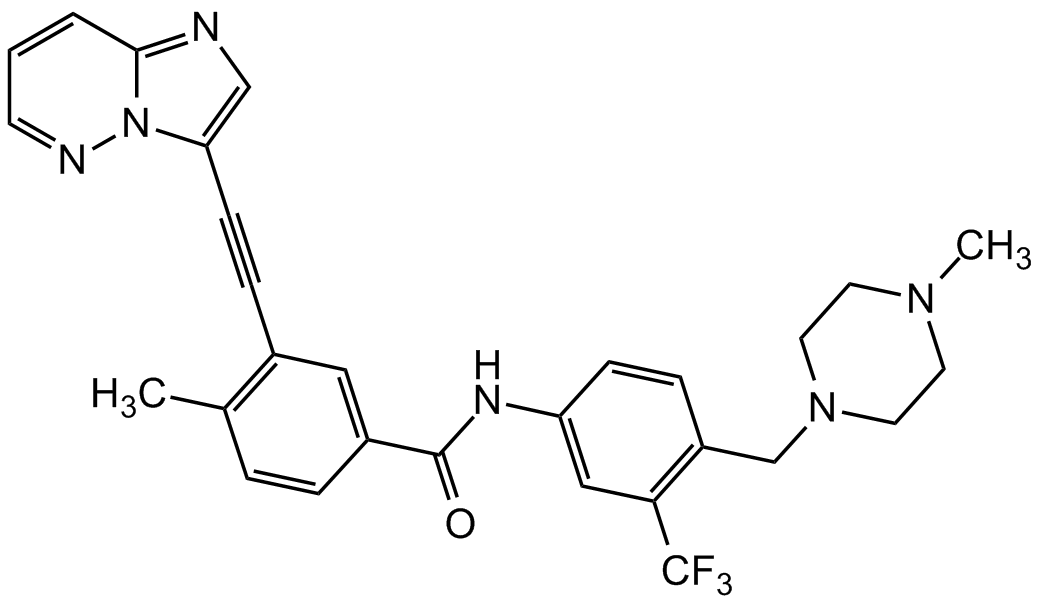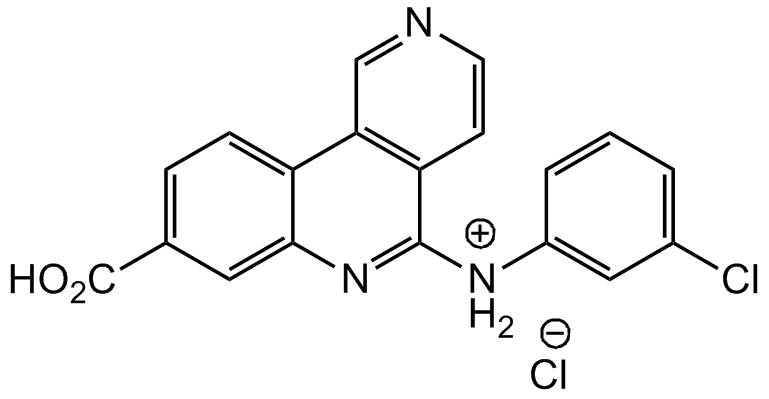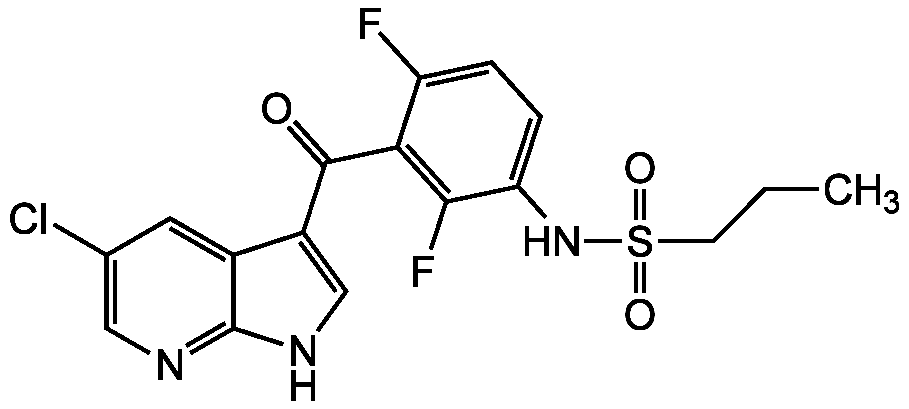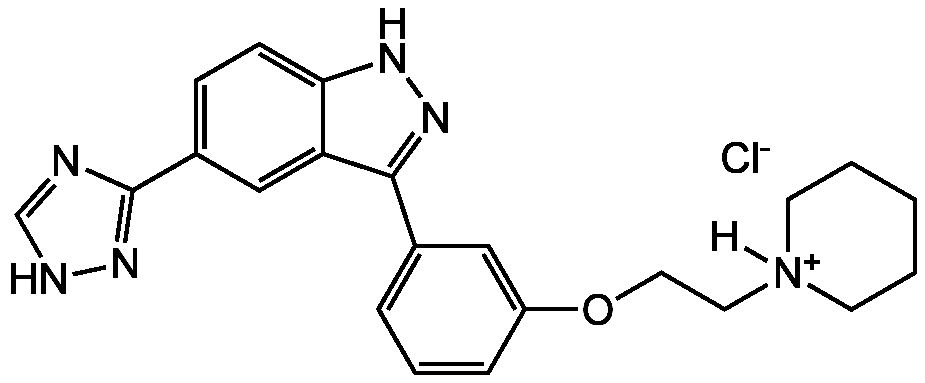
Chemical Structure
Ponatinib [943319-70-8] [943319-70-8]
AG-CR1-3538
CAS Number943319-70-8
Product group Chemicals
Estimated Purity>98%
Molecular Weight532.6
Overview
- SupplierAdipoGen Life Sciences
- Product NamePonatinib [943319-70-8] [943319-70-8]
- Delivery Days Customer10
- CAS Number943319-70-8
- CertificationResearch Use Only
- Estimated Purity>98%
- Molecular FormulaC29H27F3N6O
- Molecular Weight532.6
- Scientific DescriptionChemical. CAS 943319-70-8. Formula: C29H27F3N6O. MW: 532.6. Soluble in DMSO (30mg/ml), DMF (30mg/ml) or ethanol (5mg/ml). Ponatinib is a potent multi-target kinase inhibitor with antiangiogenic and antineoplastic activities. It targets protein tyrosine kinases (PTK), which catalyze the transfer of ATP-gamma-phosphate to the tyrosine residues of the substrate proteins. Tyrosine kinase inhibitors (TKIs) compete with ATP for the ATP binding site of PTK and reduce tyrosine kinase phosphorylation, thereby inhibiting cancer cell proliferation. Ponatinib is an orally bioavailable Bcr-Abl tyrosine kinase inhibitor of native BCR-ABL (IC50 = 0.37nM), the tyrosine kinase inhibitor-resistant mutant Bcr-AblT315I (IC50 = 2nM), as well as Bcr-AblQ252H, Bcr-AblY253F, Bcr-AblM351T and Bcr-AblH396P mutants (IC50s = 0.44, 0.3, 0.3, and 0.34nM, respectively) in biochemical assays. Ponatinib inhibits proliferation of Ba/F3 cells expressing native (IC50 = 0.5nM) or mutant Bcr-Abl (IC50s = 0.5-36nM) and induces apoptosis. It reduces tumor growth in a Ba/F3 Bcr-AblT315I mouse xenograft model when administered at doses ranging from 10 to 30 mg/kg and completely overcame resistance in cell-based mutagenesis screens. Ponatinib also inhibits other tyrosine kinases associated with vascular endothelial growth factor receptors (Flk-1 (VEGFR2) with IC50 = 1.5nM) and fibroblast growth factor receptors (FGFR1 with IC50 = 2.2nM). As a multitargeted pan-FGFR inhibitor, inhibited cell growth with GI50 values of 7 to 181nM in a panel of 14 cell lines representing multiple tumor types (endometrial, bladder, gastric, breast, lung and colon) and containing dysregulated FGFRs. Ponatinib exhibits inhibitory activity against PDGFRalpha, c-Src and c-Kit (IC50 = 1.1, 5.4 and 12.5nM, respectively). In addition, it inhibits RET (native and drug-insensitive V804M/L mutant), TIE2 and FMS-related tyrosine kinase receptor-3 (FLT3). Ponatinib enhances anticancer drug sensitivity with several other chemotherapy drugs. Formulations containing ponatinib have been used in the treatment of chronic-, accelerated-, or blast-phase chronic myeloid leukemia (CML), T315I-positive CML, or T315I-positive Philadelphia-chromosome positive acute lymphoblastic leukemia (Ph+ ALL). Ponatinib was identified as a cellular inhibitor of necroptosis by inhibiting RIPK1 and RIPK3. It also potently inhibits MEKK2 (IC50 = 10-16nM) and MEKK3 and has been identified as a STAT3 inhibitor. Ponatinib protects against influenza A virus-induced death by suppressing cytokine storm in mouse models and inhibits SARS-CoV-2 replication by non-specific (off-target) effects. - Ponatinib is a potent multi-target kinase inhibitor with antiangiogenic and antineoplastic activities. It targets protein tyrosine kinases (PTK), which catalyze the transfer of ATP-gamma-phosphate to the tyrosine residues of the substrate proteins. Tyrosine kinase inhibitors (TKIs) compete with ATP for the ATP binding site of PTK and reduce tyrosine kinase phosphorylation, thereby inhibiting cancer cell proliferation. Ponatinib is an orally bioavailable Bcr-Abl tyrosine kinase inhibitor of native BCR-ABL (IC50 = 0.37nM), the tyrosine kinase inhibitor-resistant mutant Bcr-AblT315I (IC50 = 2nM), as well as Bcr-AblQ252H, Bcr-AblY253F, Bcr-AblM351T and Bcr-AblH396P mutants (IC50s = 0.44, 0.3, 0.3, and 0.34nM, respectively) in biochemical assays. Ponatinib inhibits proliferation of Ba/F3 cells expressing native (IC50 = 0.5nM) or mutant Bcr-Abl (IC50s = 0.5-36nM) and induces apoptosis. It reduces tumor growth in a Ba/F3 Bcr-AblT315I mouse xenograft model when administered at doses ranging from 10 to 30 mg/kg and completely overcame resistance in cell-based mutagenesis screens. Ponatinib also inhibits other tyrosine kinases associated with vascular endothelial growth factor receptors (Flk-1 (VEGFR2) with IC50 = 1.5nM) and fibroblast growth factor receptors (FGFR1 with IC50 = 2.2nM). As a multitargeted pan-FGFR inhibitor, inhibited cell growth with GI50 values of 7 to 181nM in a panel of 14 cell lines representing multiple tumor types (endometrial, bladder, gastric, breast, lung and colon) and containing dysregulated FGFRs. Ponatinib exhibits inhibitory activity against PDGFRalpha, c-Src and c-Kit (IC50 = 1.1, 5.4 and 12.5nM, respectively). In addition, it inhibits RET (native and drug-insensitive V804M/L mutant), TIE2 and FMS-related tyrosine kinase receptor-3 (FLT3). Ponatinib enhances anticancer drug sensitivity with several other chemotherapy drugs. Formulations containing ponatinib have been used in the treatment of chronic-, accelerated-, or blast-phase chronic myeloid leukemia (CML), T315I-positive CML, or T315I-positive Philadelphia-chromosome positive acute lymphoblastic leukemia (Ph+ ALL). Ponatinib was identified as a cellular inhibitor of necroptosis by inhibiting RIPK1 and RIPK3. It also potently inhibits MEKK2 (IC50 = 10-16nM) and MEKK3 and has been identified as a STAT3 inhibitor. Ponatinib protects against influenza A virus-induced death by suppressing cytokine storm in mouse models and inhibits SARS-CoV-2 replication by non-specific (off-target) effects.
- SMILESCC(C=CC(C(NC1=CC(C(F)(F)F)=C(CN2CCN(C)CC2)C=C1)=O)=C3)=C3C#CC4=CN=C5N4N=CC=C5
- Storage Instruction-20°C,2°C to 8°C
- UNSPSC12161509







